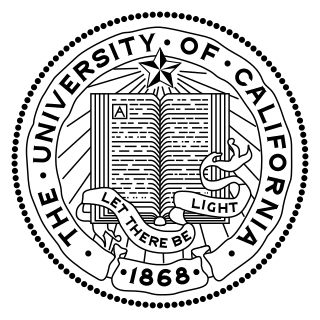
The University of California (UC) is a public land-grant research university system in the U.S. state of California. Headquartered in Oakland, the system is composed of its ten campuses at Berkeley, Davis, Irvine, Los Angeles, Merced, Riverside, San Diego, San Francisco, Santa Barbara, and Santa Cruz, along with numerous research centers and academic abroad centers. The system is the state's land-grant university. Major publications generally rank most UC campuses as being among the best universities in the world. In 1900, UC was one of the founders of the Association of American Universities and since the 1970s seven of its campuses, in addition to Berkeley, have been admitted to the association. Berkeley, Davis, Irvine, Los Angeles, Santa Barbara, and San Diego are considered Public Ivies, making California the state with the most universities in the nation to hold the title. UC campuses have large numbers of distinguished faculty in almost every academic discipline, with UC faculty and researchers having won 71 Nobel Prizes as of 2021.

The University of California, Berkeley is a public land-grant research university in Berkeley, California. Founded in 1868 and named after the Anglo-Irish philosopher George Berkeley, it is the state's first land-grant university and is the founding campus of the University of California system.

Eric Paul Allman is an American computer programmer who developed sendmail and its precursor delivermail in the late 1970s and early 1980s at UC Berkeley. In 1998, Allman and Greg Olson co-founded the company Sendmail, Inc.
The University of California, Berkeley College of Engineering is the public engineering school of the University of California, Berkeley. Established in 1931, the college occupies fourteen buildings on the northeast side of the main campus and also operates the 150-acre (61-hectare) Richmond Field Station. It is considered to be highly selective and is consistently ranked among the top engineering schools in both the nation and the world.
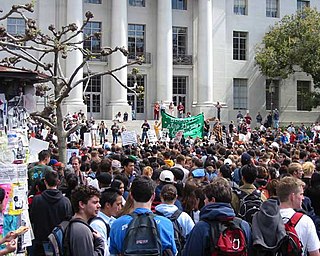
Sproul Plaza is one center of student activity at the University of California, Berkeley. It is divided into two sections: Upper Sproul and Lower Sproul. They are vertically separated by twelve feet (3.7 m) and linked by a set of stairs.
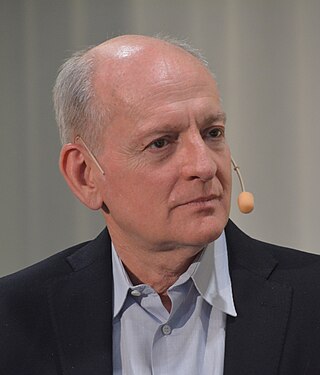
Stuart Jonathan Russell is a British computer scientist known for his contributions to artificial intelligence (AI). He is a professor of computer science at the University of California, Berkeley and was from 2008 to 2011 an adjunct professor of neurological surgery at the University of California, San Francisco. He holds the Smith-Zadeh Chair in Engineering at University of California, Berkeley. He founded and leads the Center for Human-Compatible Artificial Intelligence (CHAI) at UC Berkeley. Russell is the co-author with Peter Norvig of the authoritative textbook of the field of AI: Artificial Intelligence: A Modern Approach used in more than 1,500 universities in 135 countries.
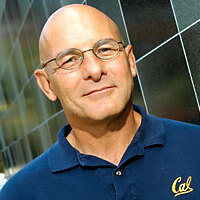
David Andrew Patterson is an American computer pioneer and academic who has held the position of professor of computer science at the University of California, Berkeley since 1976. He announced retirement in 2016 after serving nearly forty years, becoming a distinguished software engineer at Google. He currently is vice chair of the board of directors of the RISC-V Foundation, and the Pardee Professor of Computer Science, Emeritus at UC Berkeley.

The University of California Marching Band, usually shortened to Cal Band, is the marching band for the University of California, Berkeley. While it is administered under the auspices of the university, the Cal Band is almost completely student-run and represents Cal at sporting events and other social gatherings. The name of the band is officially "The University of California Band" according to the constitution, but is typically called "The University of California Marching Band" or "The Cal Band". When the band marches out of Memorial Stadium's North Tunnel for football pre-games, it is referred to as "The Pacesetter of College Marching Bands, the Pride of California".

The Associated Students of the University of California (ASUC) is the autonomous and officially recognized students' association of the University of California, Berkeley. It is the only students' association within the University of California that is fully autonomous from the university administration. Founded in 1887, the ASUC is an independent, 501(c)(3) non-profit, and unincorporated association. The ASUC controls funding for all ASUC-sponsored organizations, advocates on behalf of students to solve issues on campus and in the community, engages with administrators to develop programming, increase student-organizational resources, and increase transparency.

Christos Charilaos Papadimitriou is a Greek theoretical computer scientist and the Donovan Family Professor of Computer Science at Columbia University.
The California Pelican was a college humor magazine founded in 1903 by Earle C. Anthony at the University of California, Berkeley. Lasting eighty years, it was the first successful student humor magazine in UC Berkeley, though it was preceded by Smiles in 1891 and Josh in 1895. It is succeeded by the Heuristic Squelch, which is still running.
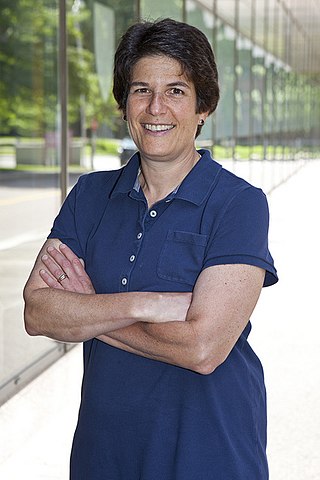
Margo Ilene Seltzer is a professor and researcher in computer systems. She is currently the Canada 150 Research Chair in Computer Systems and the Cheriton Family Chair in Computer Science at the University of British Columbia. Previously, Seltzer was the Herchel Smith Professor of Computer Science at Harvard University's John A. Paulson School of Engineering and Applied Sciences and director at the Center for Research on Computation and Society.
The University of California, Los Angeles (UCLA) traces back to the 19th century when the institution operated as a teachers' college. It grew in size and scope for nearly four decades on two Los Angeles campuses before California governor William D. Stephens signed a bill into law in 1919 to establish the Southern Branch of the University of California. As the university broke ground for its new Westwood campus in 1927 and dissatisfaction grew for the "Southern Branch" name, the UC Regents formally adopted the "University of California at Los Angeles" name and "U.C.L.A." abbreviation that year. The "at" was removed in 1958 and "UCLA" without periods became the preferred stylization under Chancellor Franklin D. Murphy in the 1960s. In the first century after its founding, UCLA established itself as a leading research university with global impact across arts and culture, education, health care, technology and more.
SLATE, a pioneer organization of the New Left and precursor of the Free Speech Movement and formative counterculture era, was a campus political party at the University of California, Berkeley from 1958 to 1966.

The Open Computing Facility is an ASUC chartered program at the University of California, Berkeley, first founded in 1989.
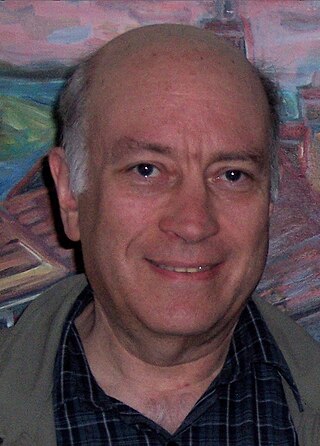
Brian Keith Harvey is a former Lecturer SOE of computer science at University of California, Berkeley. He and his students developed an educational programming language named UCBLogo which is free and open-source software, a dialect of the language Logo, as an interpreter, for learners. He now works on Snap!.

James Weldon Demmel Jr. is an American mathematician and computer scientist, the Dr. Richard Carl Dehmel Distinguished Professor of Mathematics and Computer Science at the University of California, Berkeley.

The University of California Jazz Ensembles, also known as the UC Jazz Ensembles, UC Jazz, or UCJE, is the student jazz organization founded in 1967 on the University of California, Berkeley, campus. Founded in 1967, it comprises one or more big bands, numerous jazz combos, a vocal jazz ensemble, an alumni big band, and instructional classes. With a mission statement to foster a community for the performance, study, and promotion of jazz at U.C. Berkeley, its Wednesday Night big band provides free concerts every Thursday noon on Lower Sproul Plaza, its various units perform throughout the San Francisco Bay Area including area high schools, travel to collegiate jazz festivals, and perform overseas, and for many years it sponsored the annual Pacific Coast Jazz Festival. It also provides master classes by its instructors and clinics by prominent guest artists. It has nurtured numerous musicians who have become professional jazz musicians and educators. UC Jazz Ensembles is one of three groups, with the Cal (marching) Band and UC Choral Ensembles, forming Student Musical Activities (SMA), a department within Cal Performances on the U.C. Berkeley campus. Its members are primarily U.C. Berkeley undergraduate and graduate students, representing many academic disciplines.
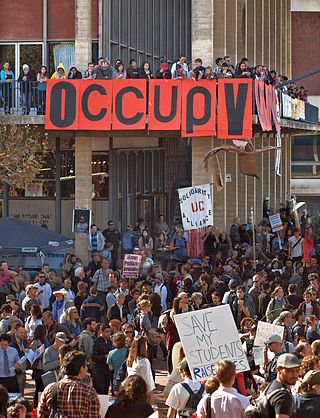
Occupy Cal included a series of demonstrations that began on November 9, 2011, on the University of California, Berkeley campus in Berkeley, California. It was allied with the Occupy Wall Street movement in New York City, San Francisco Bay Area Occupy groups such as Occupy Oakland, Occupy Berkeley, and Occupy San Francisco, and other public California universities. "Cal" in the name "Occupy Cal" is the nickname of the Berkeley campus and generally refers specifically to UC Berkeley.

Michael James Carey is an American computer scientist. He is currently a Distinguished Professor (Emeritus) of Computer Science in the Donald Bren School at the University of California, Irvine and a Consulting Architect at Couchbase, Inc..















